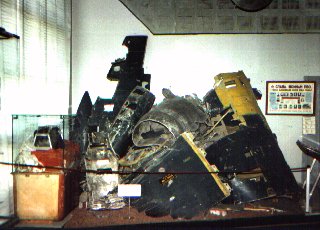|
|
|
|
BackgroundAfter 1957, tension grew between Russia and America:
The Summit MeetingsAs part of his policy of 'Peaceful Co-existence', Khrushchev was happy to meet with western leaders at 'summit' meetings to discuss issues of tension. There were four such summits:
The summit planned to discuss nuclear weapons and the situation in Berlin (Khrushchev wanted Berlin to be a ‘Free City’ with minimal military presence from other powers, and for the recognition of East Germany). Read on for what happened (it was a disaster)... See here for what happened (it was another disaster).
|
Going Deeper
History Channel - clear, basic narrative British Movietone News - can you spot all the attempts to deflect blame?
Podcast
Did You Know?
Khrushchev loved to argue, which sometimes increased tension. When American Vice-President Nixon visited Russia in 1959, he was taken round an exhibition at the US Trade Fair. At the kitchen display, he and Khrushchev had a public argument - the so-called 'Kitchen Debate' - about who had the better kitchens: communism or capitalism!
|
|
What happened?On 5 May 1960 – just 9 days before the summit – the Russians announced that on 1 May they had shot down an American U2 spy-plane. The U2 planes flew so high that the Americans believed it was out of range of Soviet fighter plane or Surface-to-Air missiles. Also, the U2 pilot, Gary Powers, had been given saxitoxin to kill himself if taken prisoner. So at first, whilst they reported that a plane had been lost, they claimed that it was because the pilot had experienced oxygen difficulties. And when the Soviet Union announced that it had shot down a spy-plane, the Americans claimed that it was a weather-plane that had gone off-course. On 7 May, however, the Russians showed the pilot Gary Powers to the world, put him on trial for spying, and showed photos of the surveillance equipment from the plane AND photographs of Soviet military bases. Khrushchev announced: I must tell you a secret. When I made my first report I deliberately did not say that the pilot was alive and well ... and now just look how many silly things the Americans have said. The Americans were forced to admit in Congress that it was an espionage mission. The whole House stood and applauded in a gesture of unity ... but internationally the US had been caught telling lies, and humiliated.
|
Source A
Wreckage of Powers's U2 plane on display at the Central Army Museum in Moscow.
Did You Know?During the Cold War, the Americans
rated their intelligence information according to to two standards:
reliability (A-D) and accuracy (1-4). Very rarely was their
information A1 GCSE pupils asked to evaluate a piece of evidence might bear this system in mind!!! |
|
The results were:
Source BLet every nation know that we shall pay any price, bear and burden, meet any hardship, support any friend, oppose any foe, for the survival and success of freedom. Now the trumpet calls again . . . against the enemies of man: tyranny, poverty, disease and war. Ask not what your country can do for you: ask what you can do for your country. Inaugural speech of President Kennedy, 1961.
|
Consider:When Eisenhower wrote his memoirs of his time as President 1956-1961, he gave them the title: Waging Peace. Explain what this reveals about America's policies and conduct in the Cold War during these years
|
|
A Continuity IssuePart Two of the AQA syllabus ('Development of the Cold War') ends at this point, and indeed it is suggested by some that the U2 incident marks the failure and end of Khrushchev's policy of peaceful co-existence. Most people, however, believe that Khrushchev continued the policy until he was removed in 1964, so if you want to complete your study of Peaceful Co-existence (and its demise) you will need to look at the Berlin Crisis of 1961, and the Cuban Missiles Crisis of 1962, which form the first topics of part three of the AQA syllabus ('Transformation of the Cold War').
|
||
|
| ||

